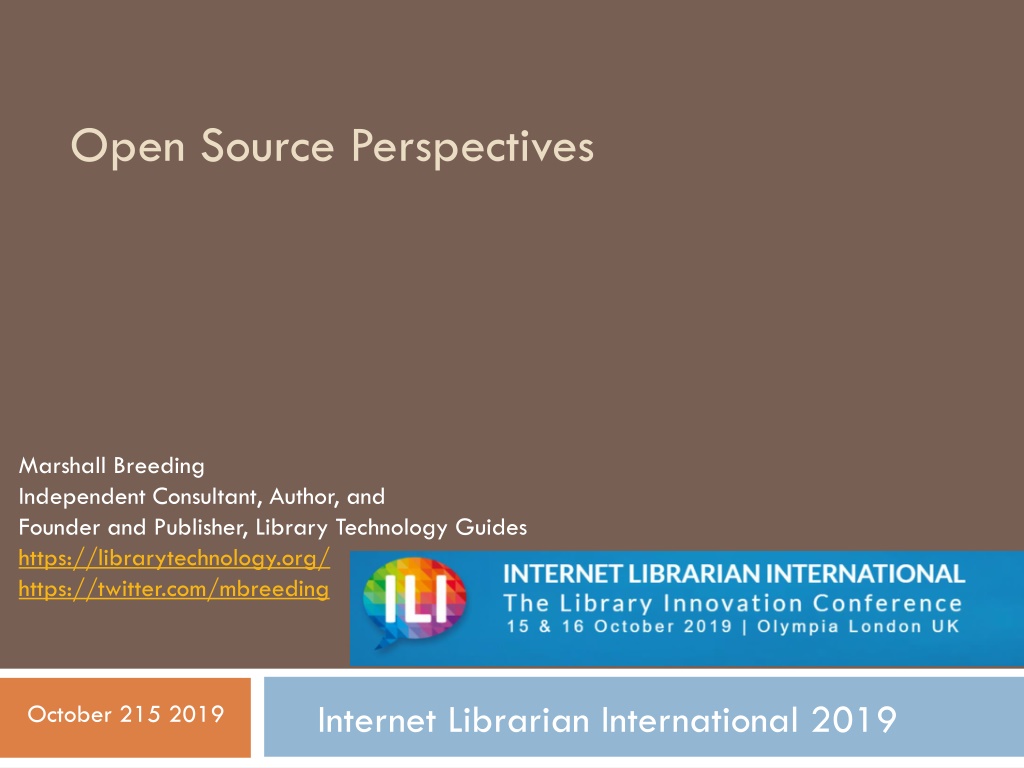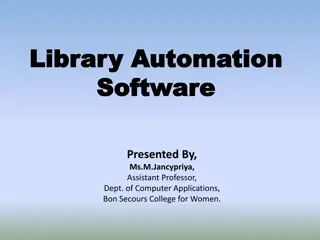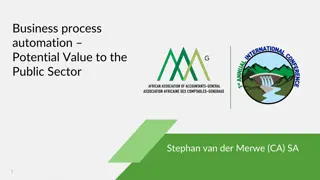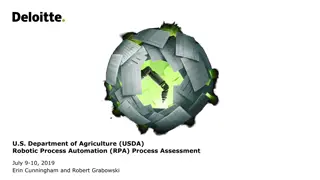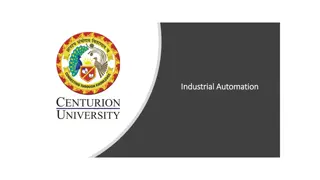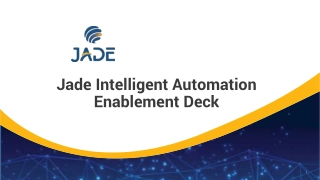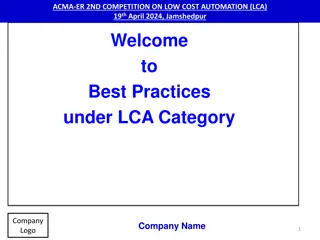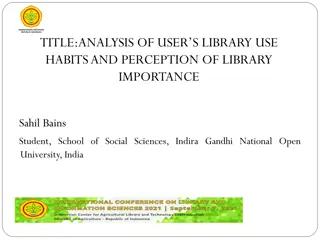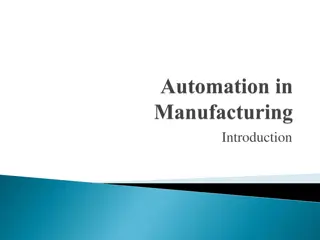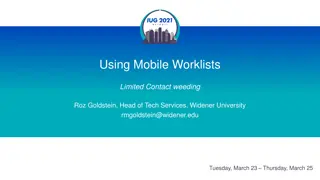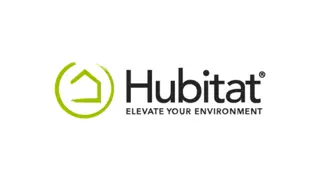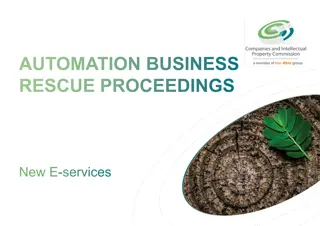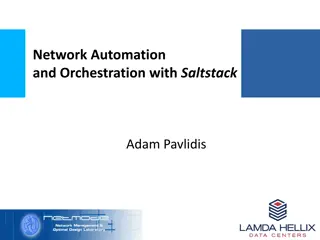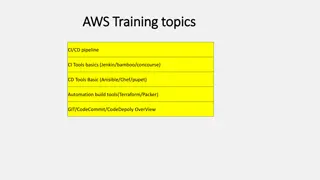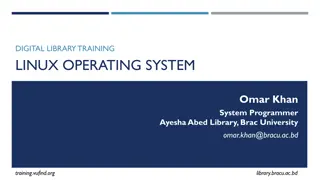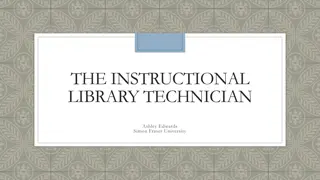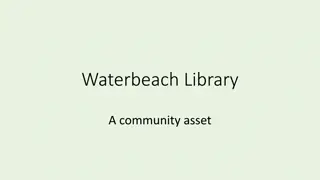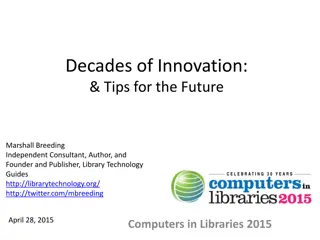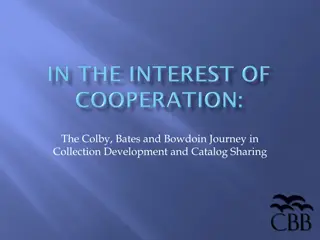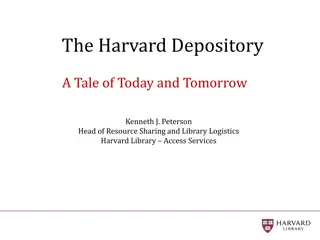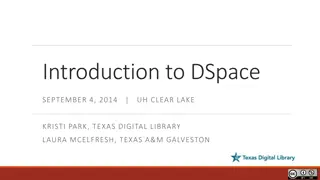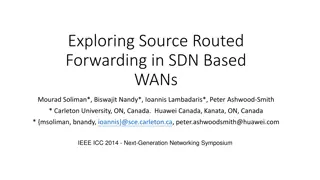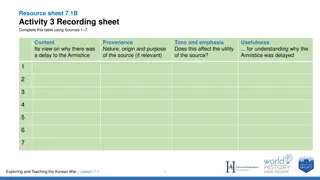The Impact of Open Source Library Automation Systems
Marshall Breeding discusses the rise of open source library automation systems globally, comparing them to proprietary alternatives. He explores the adoption of open source products in the US and their coverage in international library reports, highlighting how libraries of different budgets utilize open source vs. proprietary software.
Download Presentation

Please find below an Image/Link to download the presentation.
The content on the website is provided AS IS for your information and personal use only. It may not be sold, licensed, or shared on other websites without obtaining consent from the author. Download presentation by click this link. If you encounter any issues during the download, it is possible that the publisher has removed the file from their server.
E N D
Presentation Transcript
Open Source Perspectives Marshall Breeding Independent Consultant, Author, and Founder and Publisher, Library Technology Guides https://librarytechnology.org/ https://twitter.com/mbreeding Internet Librarian International 2019 October 215 2019
Abstract In this session, Breeding will give an overview of the impact open source library automation systems are making on the global library automation scene and how they fare compared to proprietary alternatives. Using data from libraries.org, Breeding will illustrate the adoption of open source products in the United States. Breeding will also discuss how open source products are covered in the International Library Automation Perceptions survey and report he conducts annually and in the annual Library Systems Report.
Open Source Software Expanding access to technology
Open Source vs Proprietary Software Library software available under both models Proprietary software tends to be adopted in libraries with more robust budgets but many libraries in wealthy countries also use open source ILS products Open source software widely implemented in developing nations Commercial support of open source represents a growing portion of ILS implementations in the US
Open Source Software The source code to the software must be made available Can be modified and shared No fees can be charged for the software itself Fees can be charged for services for open source software products: Support Hosting Migration Customizations OSS licenses specify different terms for sharing, re-use, commercial use, etc. (GPL, Apache)
Open Source Considered a routine part of the library technology industry 14 percent of ILS installations in US Public Libraries 6 percent of ILS installations of US Academic Libraries ByWater Solutions dominant provider of Koha services in the US 2018: 43 new contracts spanning 225 libraries Interleaf Technologies is a major Koha support provider in Ireland PTFS Europe is the major Koha support provider in the UK Evergreen: Open Source ILS for public library consortia Equinox Open Software Initiative: services for Evergreen and Koha
General observations Wealthy regions primarily use proprietary products Sophisticated systems, but with substantial costs for libraries Proprietary products not affordable by most libraries in developing world Open source ILS products have comparable capabilities and can be implemented at lower costs Gaps in functionality between open source and proprietary ILS products continue to narrow Open source options for electronic resource management are available, but have less capabilities Lack of open access knowledgebase and discovery index
Open source Library Tech Products Integrated library systems: Koha Evergreen Invenio (commercial support from TIND) ABCD ILS based on CDS/ISIS components Library Services Platforms FOLIO Still in development phase Discovery interfaces VuFind (PHP + SOLR) Blacklight (Ruby + SOLR)
Open Source Library Systems Library Technology Reports. Vol 53 No 6, Aug / Sep 2017 This issue of Library Technology Reports provides an outline of the major open source integrated library systems and library services platforms and their influence on the broader library technology industry. The advantages and disadvantages of both open source and proprietary software will be explored in the report. It includes an overview of open source resource management solutions and introduces the current landscape of these products in the industry. The chapters following closely examine the open source resource management systems Koha, Evergreen, TIND, and FOLIO. The report concludes by exploring the impact of open source products on the library automation environment.
Library Technology Industry Reports American Libraries Library Journal 2013: Rush to Innovate 2014: Strategic Competition and Cooperation 2015: Operationalizing Innovation 2016: Power Plays 2017: Competing visions for Technology, openness, workflows 2018: New Technologies enable an expended vision of library services 2019: Cycles of Innovation 2012: Agents of Change 2011: New Frontier 2010: New Models, Core Systems 2009: Investing in the Future 2008: Opportunity out of turmoil 2007: An industry redefined 2006: Reshuffling the deck 2005: Gradual evolution 2004: Migration down, innovation up 2003: The competition heats up 2002: Capturing the migrating customer
Library System Report 2019 2019 Report Theme Cycles of Innovation
2019: Cycles of Innovation Product innovation and development cycles differ for each library sector Academic: mid-way into a 15-year cycle of transition from ILS products to Library Services Platforms Publics: Mired in ongoing evolution of ILS products to add new web interfaces and patron engagement capabilities. Low level of churn of ILS trade-offs Schools: District-oriented ILS products, supplemented by content discovery and delivery services
Open Source Trends Library systems based on open source software rather than proprietary licenses continue to grow. In the US and other economically advantaged regions, most adoptions of open source ILS products are based on commercial support arrangements, which provide comprehensive services for hosting, migration, implementation, and product support. Open source ILS implementations currently represent about 14% of ILS installations in the US and 6% of academic libraries.
Koha in 2019 Systems Report Koha, launched in 1999, has received continual development, with version 18.05.09 released in February 2019. Koha has been implemented in every global region and is dominant in many countries, including India, Malaysia, Turkey, and most Latin American countries. In the developed world, Koha participates in the general mix of the ILS arena, usually through commercial support firms.
FOLIO The Future of Libraries is Open Launched by EBSCO Information Services in 2016 to create open source library services platform Initially for Academic Libraries Index Data engaged to create initial microservices framework Intellectual property assigned to Open Library Foundation Alliance with the Open Library Foundation Previously associated with the Kuali OLE project
FOLIO An open source library services platform able to manage print, electronic, and digital resources Based on a microservices architecture, including the OKAPI api gateway and Stripes user interface toolkit (verify wording) An underlying Codex metadata model able to describe and manage multiple types of content A modular design with a suite of apps that can be optionally implemented and replaced as needed without the need for wholesale changes to the overall environment. A multi-tenant design, though some libraries or support organizations may opt to deploy their own instances of the software.
FOLIO Technology Microservices architecture based on OKAPI framework and API Gatweay Modular app-based deployment Pluggable modules Apps can be added or replaced without disrupting entire implementation Multi-tenant capable, with option for locally deployed instances, or multiple vendor instances Contrasts with Alma as a single global deployment with shared codebase
Microservices-based Application Scripts/ Third Party Systems User Interfaces API endpoints Presentation Layer / UI Toolkit API Gateway Web service Service compone nts Web service Web service Web service Web service Service compone nts Service compone nts Service compone nts Microservice Service compone nts Web service Applicati on software Web service Web service Web service Microservice Microservice Web service Service compone nts Microservice Service compone nts Service compone nts Service compone nts Microservice Service compone nts Applicati on software Applicati on software Run time libraries Applicati on software Applicati on software Microservice Microservice Microservice Microservice Run time libraries Run time libraries Microservice Run time libraries Applicati on software Applicati on software Data Store Applicati on software Run time libraries Applicati on software Applicati on software Run time libraries Data Store Data Store Run time libraries Run time libraries Data Store Run time libraries Data Store Run time libraries Data Store Data Store Data Store Data Store Data Store Persistence / System Layer
Monolithic Application: Enterprise SOA Model Scripts/ Third Party Systems User Interfaces API endpoints Web service Presentation Layer Application software Business Logic Reusable Composable Services } Enterprise Service Bus Database Engine Table Table Table Table Table Table Table Table Table Table Table Table Table Table Table Table
FOLIO Discovery Enables choice for discovery Scope of functionality does not include Discovery Strategic alternative to Ex Libris bundling of Alma with Primo or Summon Current implementations plan for Blacklight, VuFind Most will use EDS for interface or article discovery Duke University will use Blacklight, ProQuest 360 knowledgebase
FOLIO First Live Implementation Chalmers University of Technology Gothenburg, Sweden Switched core operations from Sierra to FOLIO on September 30, 2019 Circulation Electronic Resource Management EBSCO Knowledgebase Cataloging and Acquisitions underway Partner with EBSCO Information Services for support and hosting Already using EBSCO Discovery Services
Planned Implementations Duke University Lehigh University Texas A&M University 5 Colleges Consortium University of Alabama Fenway Library Organization University of Chicago Cornell University North Carolina State University North Rhine-Westphalian Library Service Center (hbz) Common Library Network (GBV)
Selections through Tender Process Missouri State University National Sz ch nyi Library in Hungary Tender awarded to HerM szSoft with EBSCO Information Services and Index Data as service providers
Current Status of Open Source A routine option in the current marketplace Slow and steady adoption rates so far Koha and Evergreen compete among traditional ILS products and mostly have achieved functional parity FOLIO enters the competitive arena for academic libraries Proprietary products dominate in most product sectors
Future possibilities Unlikely to see a spike in open source adoption given previous patterns in library technology sphere though unexpected events could disrupt existing trends Adds a competitive option that provides additional competition for improved features, support, and strategic vision
Strategic perspective Select technology options best suited to advance the library in its strategic mission: Scope of functionality Alignment with operational priorities Flexibility to adapt to changing priorities Differing perceptions regarding whether proprietary or open source software models can best serve library interests
